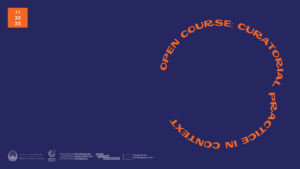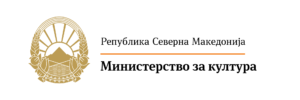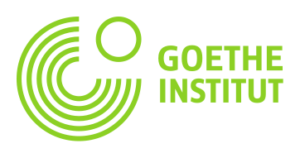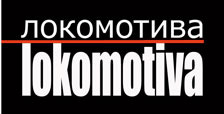
SUMMER SCHOOL CURATING IN CONTEXT
STRUGA, NORTH MACEDONIA
29.08.2022 – 02.09.2022
- GENERAL INFORMATION
Summer School “Curating in Context”/ Intensive week in Struga, North Macedonia (Aug. 29 – Sept. 2) is the first part of the Freestanding Course, HT 2022/ Curatorial Practice and Context, 7.5 credits, HT 2022
The Course is created in four parts and consists of lectures, seminars, mentor sessions and individual work:
Summer School “Curating in Context”/ Intensive week in Struga, North Macedonia Aug. 29 – Sept. 2
Intensive week of lectures, discussions, presentations and workshops.
“Composting” / online Oct. 3 – Oct. 7 – a process of developing, reshaping, reusing and recycling curatorial knowledge and information.
Reading seminars, writing and group discussions, through the logics of “The Compost”.
“Ethics and Politics of Production”/ online Nov. 7 – Nov. 11.
Lectures, presentations and discussions on issues of policies, politics, organization, advocacy or how to produce, advocate and initiate different models to present and articulate art within a specific context.
Individual writing period Nov. 12 – Dec. 12.
Writing a proposal for a curatorial project (mentoring sessions included)/ time for research and self-reflection. Send written assignment to course leaders by Dec. 7, 2022.
End of Seminar/Examination / online Dec. 13 -Dec. 16
Description of the Course Curatorial Practice and Context, 7.5 credits, HT 2022:
The course deals with a broadened perspective on curatorial and contextual practices in performing arts in relation to sociopolitical, economic and cultural contexts. The course analyzes the context in which art is produced and highlights curation in dialogue with contemporary issues such as democracy, gender, feminism, ecology and human rights. Furthermore, tools for critical and ethical reflection on curation are introduced; to produce, advocate and initiate different models to present and articulate art within a specific context. The course also offers the opportunity to develop curatorial methods in relation to activism and self-organization to rethink the curatorial practices of the performing arts.
Background:
The course is created as a result of several outcomes of the project “Curating in Context”, including the “International Summer School” and “Composting”, both dedicated to the development of critical reflection on diverse sociopolitical and economic contexts, related to curatorial approaches in contemporary (performing) arts. Thematically, both are related to the question of the curatorial and its extended understanding, which goes beyond black or white box presentation and representation politics. They analyze the environment in which art is produced and disseminated, and focus on the creation of knowledge and opportunities for practitioners who want to pursue their career as curators, or expand their artistic practice through a curatorial perspective, in the field of performing arts and interdisciplinary.
Background of the International Summer School “Curating in Context”:
This week in Struga is the third edition of the International Summer School program that started as program of the collaborative project “Curating in Context” (2019-2021) Erasmus+ supported project, co-organized between two NGOs (Tanzfabrik Berlin and Lokomotiva Skopje), and two Higher Education Institutions (Stockholm University of the Arts and University of Zagreb). More info available at https://curatingincontext.com
International Summer School was one of the outcomes, and was conceived in collaboration with the partners, co-curated by Biljana Tanurovska–Kjulavkovski and Slavcho Dimitrov, and organized by Lokomotiva.
This edition is co-curated by Biljana Tanurovska–Kjulavkovski and Slavcho Dimitrov, in collaboration with the course director Tove Salmgren, organized by Lokomotiva and SKH.
The first two editions were organized remotely and this is the first ‘school’ live. More information on the previous sessions available at https://www.lokomotiva.org.mk, under the section Curating in Context.
This edition of the program on the “International Summer School” as an integral part of the Freestanding Course, recapitulates on the previous editions and offers critical perspective on diverse cultural, sociopolitical and economic contexts, through which we are (re)thinking the curatorial practices of contemporary (performing) arts in relation to activism, self-organization and critical thinking.
The “School” discusses, reflects, theorizes and practically views diverse practices as curatorial perspectives based on (international) collaboration and goes beyond disciplinary understanding of art production, offering new models of dissemination outside of black or white box presentation and representation politics. Through the program of the school we are trying to define labor aspects of curatorial practices, viewing the curatorial as a process, or as ‘“modes of becoming” (O’Neill and Wilson 2015), an open term that exists and develops in relation to other terms and actions, and an environment in which art is produced and disseminated.
Being aware that this term, or ways of work related to it, has diverse meanings, this course will reflect on its pluralities, enabling us to rethink them and understand how curatorial strategies and practices can be activistic, socially aware, can relate art to sociopolitical and economic domains and problems, create better conditions for production and dissemination of art and critically position those processes and art in public.
Course teaching methods:
The course will provide a collaborative environment, enhance self-organized working modes and peer-to-peer analyses, mentoring exchange and other approaches that would enable fluidity of knowledge and its production through a process of exchange.
Teachers: Sergej Pristas, Tove Salmgren (TSa) Biljana Tanurovska-Kjulavkovski (BTKj),
Silke Bake (SBa), Una Bauer (UBa), Ana Vujanovic (preliminary), Rok Vevar (RVe),
Marijana Cvetkovic (MCv), Danae Theodoridou (DTh), Jasmna Založnik (JZa), Bojana Kunst (BKu), Slavcho Dimitrov (SDi), Anna Efraimsson (AEf).
Course directors: Tove Salmgren (TSa) Biljana Tanurovska-Kjulavkovski (BTKj)
____________________________________________
Lokomotiva team and collaborators of the school:
(Core team): Biljana Tanurovska-Kjulavkovski – programme director, Blagica Petrova – programme and financial manager, Zorica Zafirovska – programme and project coordinator, Gjurgjica Hristovska administrator;
(Collaborators): Kristina Todoroska-Petreska – local coordination and PR, Hristijan Tomanoski, Milko Nestoroski – local technical support and Aleksandra Nestoroska – photographer.
____________________________________________




![]()
